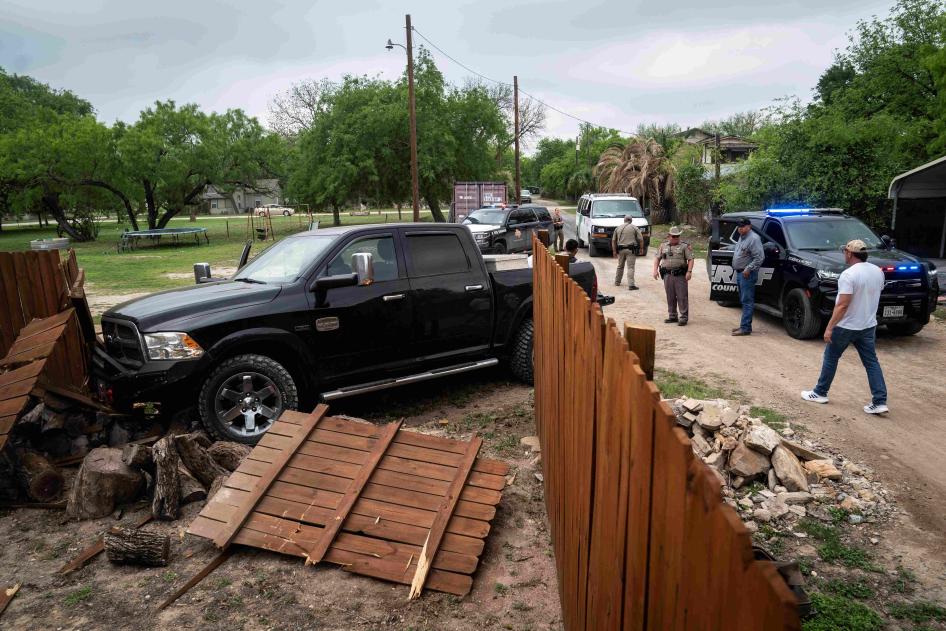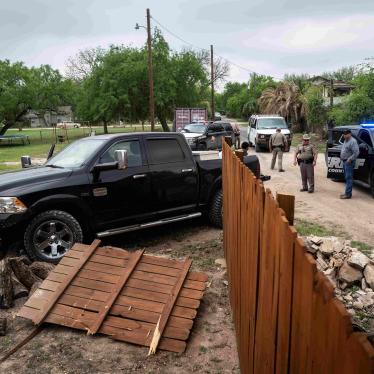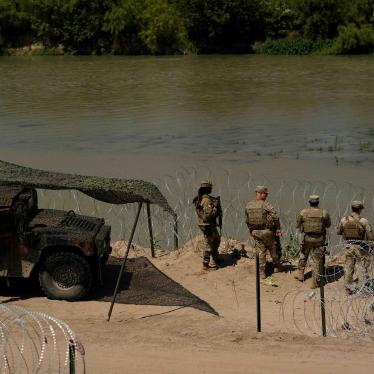(Austin) – Dangerous chases of vehicles thought to contain migrants under the Texas government’s Operation Lone Star program led to crashes that killed at least 74 people and injured at least another 189 in a 29-month period, Human Rights Watch said in a report released today. The findings indicate the monthly death rate is at least 45 percent higher than media and civil rights groups previously reported, and that injuries and property destruction are substantially worse.
The 77-page report, “So Much Blood on the Ground: Dangerous and Deadly Vehicle Pursuits under Texas’ Operation Lone Star,” documents the spike in vehicle chases by Texas Department of Public Safety troopers and local law enforcement in the 60 most heavily affected Texas counties implementing Governor Greg Abbott’s Operation Lone Star program. Records reveal that in several counties, unnecessary vehicle chases have increased by over 1,000 percent since the program began. Human Rights Watch found that residents in these counties are disproportionately affected by law enforcement vehicle pursuits and crashes.
“Public safety doesn’t require careening around Texas roadways or crashing into Texans’ cars and homes,” said Alison Parker, deputy US director at Human Rights Watch. “Texas’ Operation Lone Star is maximizing chaos, fear, and human rights abuses against Texans and migrants, which might be a cynical way to win political points but is not a responsible way to run a government.”
Human Rights Watch analyzed Texas Department of Public Safety data obtained through state records requests from March 2021, when Operation Lone Star began, through July 2023. Of the more than 5,200 total documented vehicle pursuits that Texas Department of Public Safety troopers engaged in across Texas’ 254 counties during that period, nearly 3,600, or more than two-thirds, occurred in the 60 Operation Lone Star counties that include 13 percent of the state’s population. At least seven pursuits resulted in injuries to law enforcement officers.
“Operation Lone Star puts undue pressure on law enforcement to chase cars, sometimes with very little basis, resulting in deaths of drivers, passengers, and even bystanders,” said Norma Herrera, a Texas-based consultant to Human Rights Watch. “Our review of the cases over 29 months identified at least 7 bystanders killed in these car crashes, including a 7-year-old girl out to get ice cream with her grandmother.”
Operation Lone Star is a multifaceted program of border militarization that has cost Texas residents $10 billion in spent and allocated funds. Recently, the program received international condemnation for deploying razor wire and buoys with circular saws in or near the Rio Grande to keep migrants out of the US. The program also includes arresting and prosecuting people for state trespassing or smuggling charges, involving lengthy detention and often targeting young Texans. While pursuing arrests under Operation Lone Star, Texas troopers and local law enforcement often chase vehicles for misdemeanor traffic violations, Human Rights Watch found.
Human Rights Watch found that 81 percent of the vehicle pursuits in Operation Lone Star counties were initiated because of a traffic violation, 97 percent of them misdemeanors such as speeding, or not obeying traffic signals. Human Rights Watch found that the average maximum speed during the chases was 91 miles per hour, with a third involving speeds over 100 miles per hour.
Some current and former Texas law enforcement personnel interviewed for the report described alternative ways to pursue suspects, including using license plate information and evidence gathered from helicopters. These experts expressed the view that high speed chases were not needed to investigate and apprehend people suspected of transporting migrants.
“Texans want our government to show us it can do its job, but Operation Lone Star and these dangerous and deadly car chases are bringing a sense of chaos and lack of humanity to my neighborhood and to my state,” said Amerika Garcia Grewal, Eagle Pass community member and member of Eagle Pass Border Coalition. “I want Texas law enforcement to stop killing people and I want Operation Lone Star to end. This is not the kind of government my community needs.”
Governor Abbott has attempted to justify Operation Lone Star as necessary to deter migration and disrupt cartels involved in drug smuggling, but by his own standards, the mission has largely been a failure. In July 2023, the Wall Street Journal found that, the part of the border targeted has has instead seen the most rapid increase in unauthorized migration in the state since the program began.
A March 2022 Texas Tribune article revealed that the data cited by the governor was for statewide drug seizures, not those solely tied to Operation Lone Star. In fact, the program has swelled the profits of drug cartels and smugglers, who can now charge a premium to help migrants cross the increasingly dangerous terrain.
Instead of ending Operation Lone Star, the Texas legislature in two special sessions in October, passed bills to create a new crime of “illegal entry” under state law and to increase the sentence imposed for smuggling to a 10-year mandatory minimum, both of which will result in disproportionate imprisonment of young Texans of color and increase pressures on law enforcement to engage in dangerous vehicle pursuits, Human Rights Watch said.
Operation Lone Star vehicle pursuits result in a higher rate of death than most high-speed pursuits nationwide, Human Rights Watch found. The annual vehicle pursuit death rate in the 60 counties studied was 1 per 112,000 people, eight times as high as the national rate of 1 per 820,000 people, calculated from a USA Today study of pursuits between 1979 and 2013.
Property damage from vehicle pursuits has also increased in Operation Lone Star counties. Average losses from chases were at around $73,000 per month before March 1, 2021, with losses rising to over $177,000 since that date, an increase of 142 percent.
“Operation Lone Star shows a reckless disregard by the state of Texas for the most basic human rights,” Parker said. “If the government of Texas won’t stop the chaos, the US federal government needs to end federal funding for agencies implementing Operation Lone Star and send civil rights officials to investigate all rights abuses happening under the program, starting with the right to life.”










